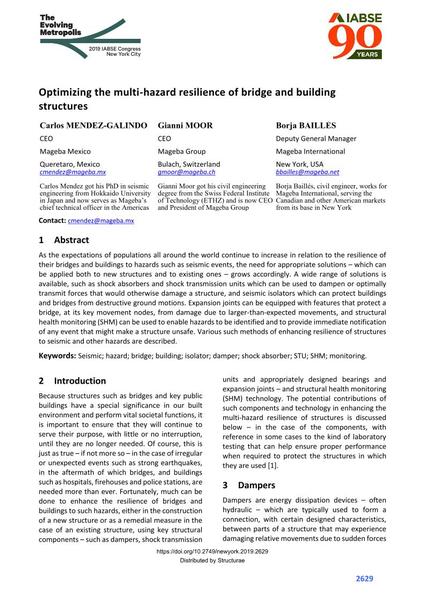Optimizing the multi-hazard resilience of bridge and building structures

|
|
|||||||||||
Bibliographic Details
| Author(s): |
Carlos Mendez-Galindo
(Mageba Mexico)
Gianni Moor (Mageba Group) Borja Baillés (Mageba International) |
||||
|---|---|---|---|---|---|
| Medium: | conference paper | ||||
| Language(s): | English | ||||
| Conference: | IABSE Congress: The Evolving Metropolis, New York, NY, USA, 4-6 September 2019 | ||||
| Published in: | The Evolving Metropolis | ||||
|
|||||
| Page(s): | 2629-2636 | ||||
| Total no. of pages: | 8 | ||||
| DOI: | 10.2749/newyork.2019.2629 | ||||
| Abstract: |
As the expectations of populations all around the world continue to increase in relation to the resilience of their bridges and buildings to hazards such as seismic events, the need for appropriate solutions – which can be applied both to new structures and to existing ones – grows accordingly. A wide range of solutions is available, such as shock absorbers and shock transmission units which can be used to dampen or optimally transmit forces that would otherwise damage a structure, and seismic isolators which can protect buildings and bridges from destructive ground motions. Expansion joints can be equipped with features that protect a bridge, at its key movement nodes, from damage due to larger-than-expected movements, and structural health monitoring (SHM) can be used to enable hazards to be identified and to provide immediate notification of any event that might make a structure unsafe. Various such methods of enhancing resilience of structures to seismic and other hazards are described. |
||||
| Keywords: |
bridge damper seismic building monitoring SHM Hazard isolator shock absorber STU
|
||||
